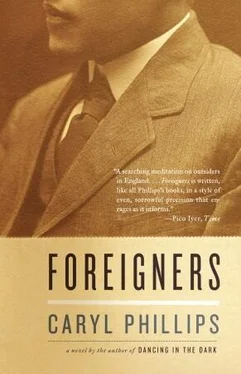At the conclusion of the short and unsatisfactory service, it was understood that we members of the Literary Club would repair to a nearby familiar tavern in order that we might drink toast after toast in the doctor's honour until late into the night. Aside from rehearsing the details of the great man's life, there would be other subjects for discussion, including the controversial nature of the day's truncated ceremony, and the question of the will and the disposal of the doctor's assets. These subjects would undoubtedly keep myself and my fellow devotees of Dr Johnson happily occupied for many hours, but I knew full well that Francis Barber, without the protection of his master, would not be invited to join the company. As I stood to take my leave of the abbey, I looked again at this forlorn figure bent forward in the pew and seemingly reluctant to rise to his feet. It occurred to me that the Christian thing to do might be to approach the negro and offer him sincere commiserations for his loss, thereby once again extending the hand of friendship, but I had no desire to place the servant in an awkward predicament and so I cast him a final glance and strode purposefully down the aisle towards daylight, leaving this abandoned man alone in the abbey with his master and his dark thoughts.
Some sixteen years after the funeral of the good doctor, I found myself comfortably appointed inside a carriage that was bowling into Lichfield, a fair-sized city with a reputation bolstered by Mr Daniel Defoe's favourable comments in which he recorded that he considered Lichfield a place for 'good conversation and good company'. I had been led to believe that this low-lying city, surrounded by fields and woods and marshes, was principally distinguished by its fortunate location, situated as it is 110 miles north of London, and a mere 14 miles beyond Birmingham. This places the city in an advantageous position on the main coaching route to the north-west and Ireland, but I understood Lichfield to be also renowned for its beautiful, yet somewhat eccentric, cathedral that was long ago constructed out of faded red stone, and which displays not one but three spires. I had arranged to spend a single night at the Three Crowns, a respectable inn that I had been led to believe was situated close by the doctor's childhood home. Having arrived at my destination, I announced myself to the ruddy-faced innkeeper who quickly escorted me to my room on the first floor. He informed me that dinner would soon be served, and as my hunger had been powerfully aroused by the long journey I suggested to him that I would like to dine as soon as possible. He lowered his eyes somewhat apologetically as he informed me that it might take his cook a full half-hour to prepare my meal, but in the meantime he encouraged me to try some Staffordshire oatcakes and a jug of Lichfield Olde Ale, which I hastily declined.
I dined alone, but under the judicious scrutiny of a young drudge who had clearly been instructed to cater to my needs. I ignored the lackey and carefully observed the boisterous local folk, who noisily refreshed themselves with draught after draught of malty beer. Having finished my adequate, but by no means exceptional, meal I interrogated my simple host with regards to the origins of the city, at which point he asked permission to join my table. He told me that legend had it that around AD 300, and during the reign of the Roman Emperor Diocletian, over 1,00 °Christians were martyred nearby. According to this man, the name Lichfield actually means the 'field of the dead'. My host refreshed my glass of port-wine before laughing out loud and conceding that there was no evidence to support this fact , but he knew it to be true and beyond contention. He also 'knew' that there were no thatched roofs in Lichfield because of the risk of fire, a peculiarity which set this city apart from most English centres to the north or south. Exulting in what he imagined to be his own pleasantry, he continued and informed me that Queen Mary had long ago made Lichfield its own county, so that while the city stands in Staffordshire it does not take part as a member of the said same county. And what, I asked, now warming to the task which had occasioned me to leave London and travel to Lichfield, of the city's prominent or notorious citizenry? At this my host was quick to laugh out loud and proclaim two names that he insisted would be familiar to any who held English to be his tongue: David Garrick and Samuel Johnson. As though this were too easy a resolution to my question he continued and, clearly relishing the heat of conversation and the close proximity to controversy, he lowered his voice and informed me that some 200 years ago the last person to be burnt at the stake in England for heresy was burnt in Lichfield. I nodded sagely and then bided my time before asking after negroes. 'Negroes?' The man seemed confused. 'Around here?' he asked. I said nothing further and waited for him to continue, and then I saw his pockmarked cheeks begin to flush. 'I see. I suppose a gentlemen like you must be asking after Frank Barber?'
I slept badly in the awkward bed, for the whole contraption seemed to be woefully misshapen from having no doubt supported the fatigued bodies of countless exhausted pilgrims. Being one who was not familiar with the turmoil of undertaking frequent excursions, leaving London constituted for me a great adventure of sorts. Having recently retired from my commercial business in the City, where I grew to despise the vulgar rapacity of the sugar and slave men of the West Indies, I had recently begun to contemplate some involvement in the Province of Freedom — Mr Granville Sharp's scheme for resettling blacks on the west coast of Africa in an efficiently managed colony — as a way of honourably investing my money for profit and charitably passing my days. This being the case, my ageing mind was forever returning to the disturbing image of poor Francis Barber all alone in Westminster Abbey, and I finally understood that before making any decision about my own future philanthropic investments it might profit me to revisit the past and try to discover what had become of the forlorn negro. I wondered, was he yet another example of a poor transplanted African whose roots had refused to properly catch the soil of our fair land? Or had life beyond his master's departure showered the negro with good fortune? It chanced that my late-night conversation with the lumpish innkeeper had helped to clarify the situation. Eventually the light of day began to spill through the shuttered windows, and I heard stirrings in the various rooms about the Three Crowns, but I did not move. Recalling the previous evening's conversation, I found myself caught in a web of indecision. Should I follow my host's suggestion and seek out the widow, Mrs Elizabeth Barber, or should I simply depart in the direction of London and admit defeat in my quest. I lay in bed while the day announced itself as a fine summer's morning, and then I heard a timid knock upon the door which I assumed would be the servant bearing water for my ablutions.
The carriage bounced its way unceremoniously down the rutted lane, and I was sure that the ancient driver was deriving childish pleasure from seeking the most difficult and bone-jarring route. The carriage window afforded a fine prospect, and I looked warmly upon the young English maidens labouring merrily in the fields who knew that at the end of their working day there would be liberty and freedom. How different a life it was for those who we forced to expend themselves in the tropical fields of the West Indies. At the end of their day, there was neither liberty nor freedom, but merely the expectation of more suffering unredeemed by any financial or material gain. I continued to stare at the young maidens, but soon realised that, despite their obvious beauty, I should avert my eyes and focus my mind on the task at hand. The previous evening my host, having conveyed the dreadful news of Francis Barber's demise, had continued and informed me that, to the best of his knowledge, the family of Francis Barber had last been heard of living in a place named Burntwood, a hamlet that lay only four miles beyond the city to the west. Having given me this information, the innkeeper had ceased speaking for a few moments as though his mind was tormented with some burdensome secret. 'You do understand,' he said, 'that this is not a place to which those such as yourself habitually journey. Truly, there is nothing there of any consequence.' Again he paused. 'Except, of course, that you will most likely discover Mrs Barber.' With this said the man once again topped off our glasses with wine, and thereafter we fell silent for what remained of the evening. Securing the services of the ancient driver and carriage had been relatively simple, for the innkeeper had made it his business to assist me. However, this morning, when my host informed the driver that Burntwood was to be my destination, the puzzled look on the face of the wizened man spoke eloquently to all that the innkeeper had suggested. It was difficult to ascertain if the aged driver was genuinely offended, or merely temporarily surprised, at having been instructed to undertake a journey to such a place.
Читать дальше











![Unknown - [Carly Phillips] The Bachelor (The Chandler Brothe(Bookos.org) (1)](/books/174132/unknown-carly-phillips-the-bachelor-the-chandle-thumb.webp)
